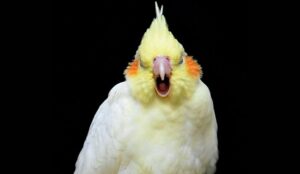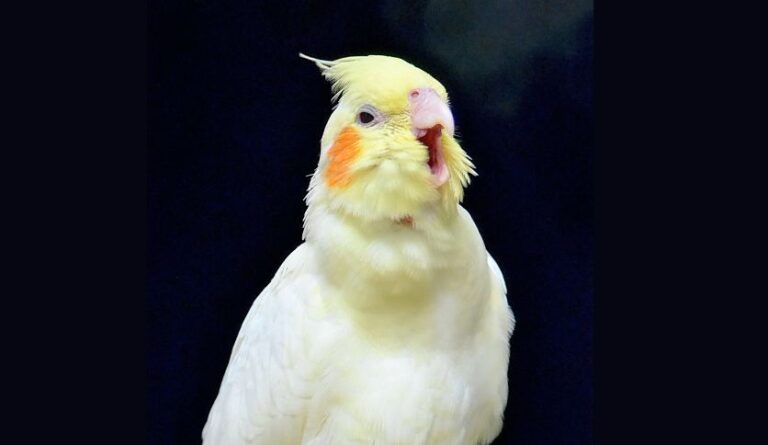Cockatiels may hiss due to fear or territorial behavior. An accurate answer to why your cockatiel hisses is likely due to fear or territorial behavior.
This behavior can be common among cockatiels when they feel threatened or if they are protecting their territory. Hissing is a way for them to communicate their discomfort or assert dominance. It is important to understand the underlying cause and address any potential triggers to create a safe and calm environment for your cockatiel.
Understanding Cockatiel Behavior

Cockatiels are known for their unique communication through body language and vocalizations. One common behavior that cockatiels exhibit is hissing. Hissing is a way for cockatiels to express their discomfort or fear. It is important to understand why your cockatiel may be hissing to ensure their well-being.
Cockatiels communicate through various body language cues. Hissing is often accompanied by other signs such as fluffing up their feathers, lowering their crest, or retracting their body. These behaviors indicate that your cockatiel is feeling threatened or cornered. It is crucial to respect their personal space and avoid situations that may make them uncomfortable.
Besides hissing, cockatiels produce a wide range of vocalizations to express themselves. These include chirping, whistling, screeching, and mimicry of sounds they hear in their environment. Each sound has a different meaning, such as calling for attention, expressing happiness, or signaling danger. Paying attention to their vocalizations can help you understand their current state of mind.
Common Triggers For Hissing
One of the most common concerns of cockatiel owners is why their beloved pets hiss. Hissing in cockatiels can be triggered by various factors, including aggression and territoriality, fear and defensive reactions, and protective instincts towards their cage or possessions.
Aggression and territoriality: Cockatiels, like many other pets, can display aggression when they feel threatened or want to assert dominance. This aggressive behavior can manifest as hissing.
Fear and defensive reactions: Cockatiels are naturally cautious creatures and may hiss when they feel scared or threatened. This can occur if they perceive a sudden movement or loud noises that frighten them.
Protective instincts towards their cage or possessions: Cockatiels can become possessive of their cage, toys, or food dishes. When they feel their space is being invaded, they may hiss as a warning to keep their possessions safe.
Understanding the triggers for hissing can help cockatiel owners identify the underlying causes and take appropriate measures to address them. Providing a safe and comfortable environment, socializing with the bird, and creating a routine can help alleviate hissing behavior in cockatiels.
Medical Conditions That Cause Hissing
When a cockatiel hisses, it may indicate underlying medical conditions. Respiratory issues and breathing difficulties can cause hissing in these birds. Irregular breathing patterns or infections in their respiratory system can lead to a hissing sound. Injuries or pain, especially in the throat or chest area, can also cause a cockatiel to hiss. If the bird has experienced any trauma or is in discomfort, it may exhibit this behavior to communicate its distress. Additionally, hormonal changes and reproductive behavior can contribute to hissing in cockatiels. During the breeding season, males may become territorial and aggressive, resulting in hissing behavior. Monitoring a hissing cockatiel closely and consulting a veterinarian to rule out any underlying health issues is essential.
Frequently Asked Questions For Why Does My Cockatiel Hiss
What Does It Mean If A Bird Hisses At You?
A hissing bird might feel threatened or scared, trying to warn you to back off.
How Do You Know If A Cockatiel Is Angry?
You can tell if a cockatiel is angry by noticing signs such as hissing, lunging, biting, raised crest feathers, fluffed feathers, and aggressive body language. Be attentive to their behavior to gauge their emotions accurately.
Why Is My Cockatiel Aggressive?
Cockatiels can become aggressive due to various reasons like fear, territoriality, hormonal changes, or inadequate socialization. Providing a safe and stimulating environment, proper training, and meeting their social needs can help reduce aggression in cockatiels. Regular interaction and positive reinforcement can contribute to a happier and more well-behaved bird.
Why Does My Cockatiel Squawk At Me?
Cockatiels may squawk at you for various reasons, such as seeking attention, feeling territorial, or expressing excitement. Providing proper socialization and positive reinforcement can help address this behavior.
Conclusion
Understanding why your cockatiel hisses can help foster a harmonious relationship between you and your feathered friend. By considering factors such as fear, territorial behavior, or health issues, you can address the underlying causes. With patience, positive reinforcement, and proper care, you can create a calm and nurturing environment that encourages your cockatiel to express its natural behaviors in a non-aggressive manner.
Stay attentive to your bird’s needs and consult a veterinarian if necessary.

Hi, I’m Regina Rios. Just another bird lover who loves to share knowledge from personal experience. I’ve grown up with pet birds since childhood as my mommy also loves birds. As I can’t pet many birds in open air in my house as my mom does; I created my first bird cage on my rooftop using wood, copper wire, and a metal shed in 2018 and start collecting pet birds. Now, I have so many pet birds such as Macaws, Parrot, Cockatiel, Parakeet, and others. Not only that, if I see natural birds are injured I keep them in my house until they get well. Now, my hobby becomes my income source as my home birds have babies and I sell them to birds lover like mine. I’ve created this blog to inspire others bird owners by sharing my personal knowledge. Good Luck!

